Politics
/
August 1, 2024
In providing a platform to Donald Trump, the NABJ opted for a totally predictable outcome—35 minutes of insults and racism.
Donald Trump speaks with Rachel Scott, senior congressional correspondent for ABC News, during a question and answer session at the National Association of Black Journalists convention on July 31, 2024, in Chicago, Illinois.
(Scott Olson / Getty Images)
On Wednesday, Donald Trump attended the National Association of Black Journalists (NABJ) annual conference and did a sit-down interview with three Black women: Rachel Scott of ABC News, Kadia Goba of Semafor, and Harris Faulkner from Fox News.
Trump was, entirely predictably, racist and disgusting. The “headline” was his wild attack on Vice President Kamala Harris’s race. “I didn’t know she was Black until a number of years ago,” he blathered, “when she happened to turn Black, and now she wants to be known as Black. So I don’t know, is she Indian or is she Black?” For the record, Harris’s father is Afro-Jamaican, and bumbaclots who think Jamaicans aren’t “Black” are welcome to kiss my entire Haitian ass.
Of course, Trump received no pushback against his racist claims from the panel, nor was he fact-checked or challenged on any of the other lies and mistruths he spewed from the stage—including the entirely preposterous claim that Harris and the Democrats support abortions of fully alive, already-born children. Indeed, reports indicate that Trump threw some kind of temper tantrum backstage when he was informed that he would be fact-checked live by the panel, delaying his appearance for nearly an hour before the NABJ leaders pathetically relented and agreed to allow him to lie from their stage.
In the hours since, the media has provided Trump with the headlines he desires, twisting his racist attack on Harris into questions about her heritage. Instead of asking, “Why is the 78-year-old white man trying to define the race of his political opponent?,” they’re acting like biracial people are confusing.
This, however, was always going to be the outcome of allowing Trump to speak at the NABJ conference. Trump was always going to exploit the occasion to baselessly attack his Black woman opponent in front of a Black audience. Anybody can ask Trump a question. They can even ask him a “tough” question. But getting an answer to that question, and smacking down the lies he tells on the way to an answer, takes real journalistic skill. There are plenty of Black journalists who have those skills; Harris Faulkner is not one of them. Nor was Kadia Goba up to the task. Rachel Scott acquitted herself well, but it was an impossible situation.
Current Issue
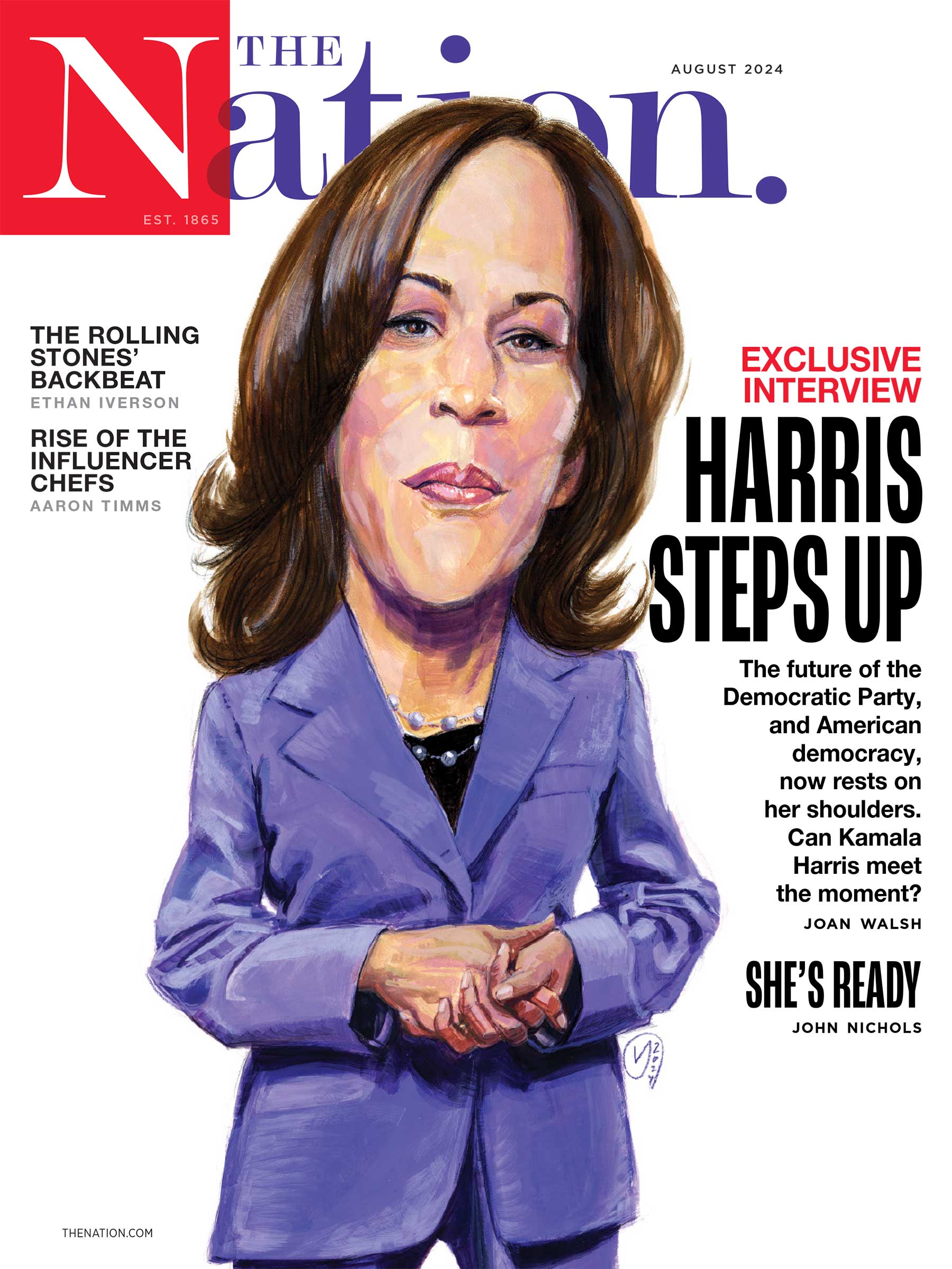
The interview couldn’t have come at a better time for Trump. The NABJ always invites presidential candidates to attend its conference, and the three-time presidential candidate has always declined in the past. Why did he agree to attend this year? I can only guess, but it is worth noting that Trump is currently dodging accusations that he’s a scared little punk for refusing to debate Harris. Now, instead of continuing to focus on why Trump is afraid to debate the Black woman he’s running against, the media will give him a news cycle or two of people talking about how “brave” he was to answer questions from a whole panel of Black women. Sure, he’s not running against any of them, but you know how his people tend to think all Black people look the same.
Trump’s mission was accomplished before he even took the first question. Still, I know that a lot of people will want to focus on everything that happened after he started speaking. By any objective political measure, the interview was a disaster for Trump. He came off as racist and mean-spirited. He promised to give cops immunity for beating up Black protesters. At one point, he even reached over, grabbed Scott’s water bottle, tightened the cap on it, and gave it back to her, which is just… weird. You don’t have to take my word that the interview went poorly for Trump: His own team pulled him off the stage after 35 minutes of what was supposed to be an hour-long panel.
But exposing Trump as an awful human has functionally no journalistic value at this point. Is there a single person in the country who didn’t think Trump was racist before but does now? Is there a solitary voter who is saying to themselves, “I was going to vote for Trump but now seeing how he treated three Black women, I don’t know, I have my doubts”? It is a shockingly common belief among left-of-center folks to think that more exposure to Trump’s gross and unpopular antics will turn public sentiment against him, yet over the past eight years I’ve seen nearly no evidence of that actually happening, especially when those antics involve attacking Black people. Trump is an ignorant racist: Everybody either knows that, is that, or decided that is not a problem.
That’s why the interview was pointless. One question I like to ask myself before investing time and energy into exposing a white man’s racist, incoherent worldview is, “What will I win? What is the upside for my efforts? If I’m going to deploy myself against somebody, what will I get if I’m successful?” In this situation, Trump was given the opportunity to insult Black folks for 35 minutes, to our faces. What did we win for weathering that storm?
Then again, maybe I am asking the wrong question, because the point of this gross debacle was not to help Black people, or the American electorate writ large, become more informed or knowledgable about the positions of the presidential candidates. If that had been the point, the NABJ wouldn’t have put a Trump stooge on the panel. If that had been the point, the NABJ would have allowed Kamala Harris to speak as well, instead of denying her request to attend virtually. Harris couldn’t make the conference in-person because she was attending the funeral of Black congresswoman and icon Sheila Jackson Lee. You could say that Harris couldn’t show up to perform blackness because she was too busy actually being Black.
Perhaps the better question to ask is, “What did the NABJ win?” And the answer to that question is more complicated. First of all, the NABJ won profile and relevance. Sure, Ken Lemon, the president of the NABJ and the person who made the executive decision to invite Trump, has caused a deep rift in his organization. (To cite just one example of the rank-and-file revolt against platforming Trump, the fantastic Washington Post columnist Karen Attiah stepped down from her role as cochair of this year’s conference.) But people are clicking. People are engaging. More people know who Ken Lemon is now, so he’s got that going for him. Everything Trump touches dies, but everything Trump touches also gets way more attention.
There are less cynical victories for the organization as well. Black people are not a monolith, and neither are Black journalists. There are more Black journalists like Harris Faulkner than one might think. If you understand how conservative media works these days, you know that fealty to Trump is just as important for journalists who want to advance their careers as it is for politicians or judges who want to rise up the ranks in Trumpworld. Giving the conservative members of the NABJ an opportunity to lick Trump’s boots just like the white folks do enhances the job opportunities for those Black conservatives. If there’s one thing Black conservative journalists hate, it’s people assuming they are more resistant to the authoritarian takeover of the country than others, just because they’re Black.
There is value, I suppose, in showing the world that Black journalists can be just as craven and careerist as white folks. It is, from a certain point of view, a sign of progress that there are Black journalists who can be as useful to the cause of white supremacy as white journalists. There is not a damn thing NABJ did to platform Trump that hasn’t already been done by CNN, The New York Times, or nearly every other journalistic publication or association over the past eight years. White journalists have been making money and careers off of Trump since he came down his golden escalator. Having access to, and the blessing of, Donald Trump is the only form of currency right-wing media will accept. It would be hypocritical to treat the people who made this decision at the NABJ any worse than, say, Maggie Haberman.
Really, the only reason to be disappointed in the NABJ’s decision is if you, like me, expect Black journalists to be better than their white counterparts. One can only be disappointed if you think Black journalists have a higher responsibility, and a greater duty, than their white colleagues to stand together against fascism.
I do think Black journalists have a greater responsibility on certain issues than our white colleagues. It is a duty that I don’t always enjoy, but never shirk. And it is a duty that so many awesome Black journalists are rising to meet: Attiah, Michael Harriot, April Ryan, and Roland Martin, to name a just few. All have stood against the NABJ in this moment.
But not every Black journalist thinks that way. Not every Black journalist wants that burden. The most accurate statement I can make about the NABJ’s decision to platform Trump is: they acted white. I’m not even mad at them for doing that. I’m just extremely disappointed.
Popular
“swipe left below to view more authors”Swipe →
Can we count on you?
In the coming election, the fate of our democracy and fundamental civil rights are on the ballot. The conservative architects of Project 2025 are scheming to institutionalize Donald Trump’s authoritarian vision across all levels of government if he should win.
We’ve already seen events that fill us with both dread and cautious optimism—throughout it all, The Nation has been a bulwark against misinformation and an advocate for bold, principled perspectives. Our dedicated writers have sat down with Kamala Harris and Bernie Sanders for interviews, unpacked the shallow right-wing populist appeals of J.D. Vance, and debated the pathway for a Democratic victory in November.
Stories like these and the one you just read are vital at this critical juncture in our country’s history. Now more than ever, we need clear-eyed and deeply reported independent journalism to make sense of the headlines and sort fact from fiction. Donate today and join our 160-year legacy of speaking truth to power and uplifting the voices of grassroots advocates.
Throughout 2024 and what is likely the defining election of our lifetimes, we need your support to continue publishing the insightful journalism you rely on.
Thank you,
The Editors of The Nation
More from The Nation
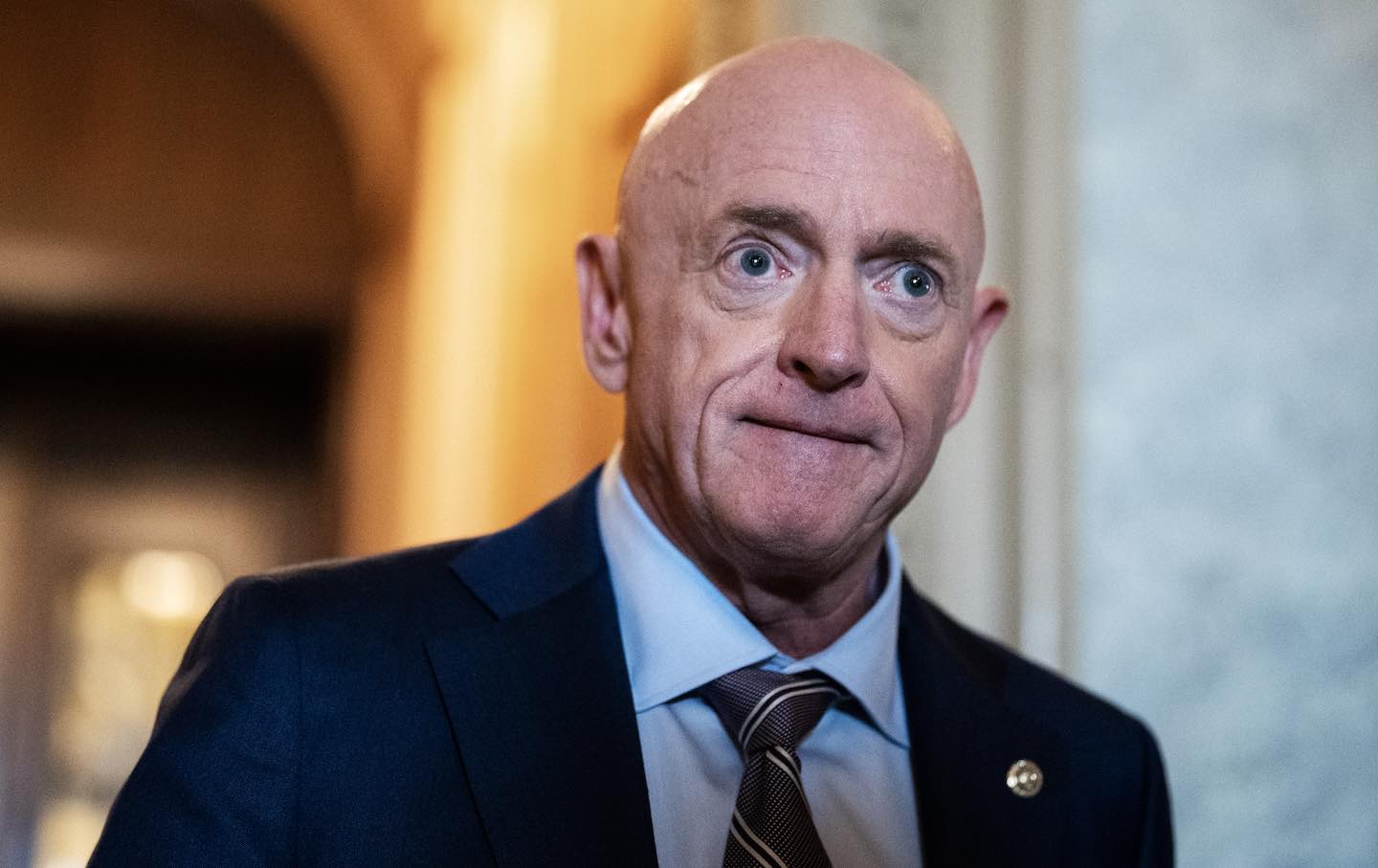
The senator from Arizona refused to co-sponsor labor’s top legislative priority when it mattered. Only when he made the vice-presidential short list did he step up. from Arizona.
John Nichols
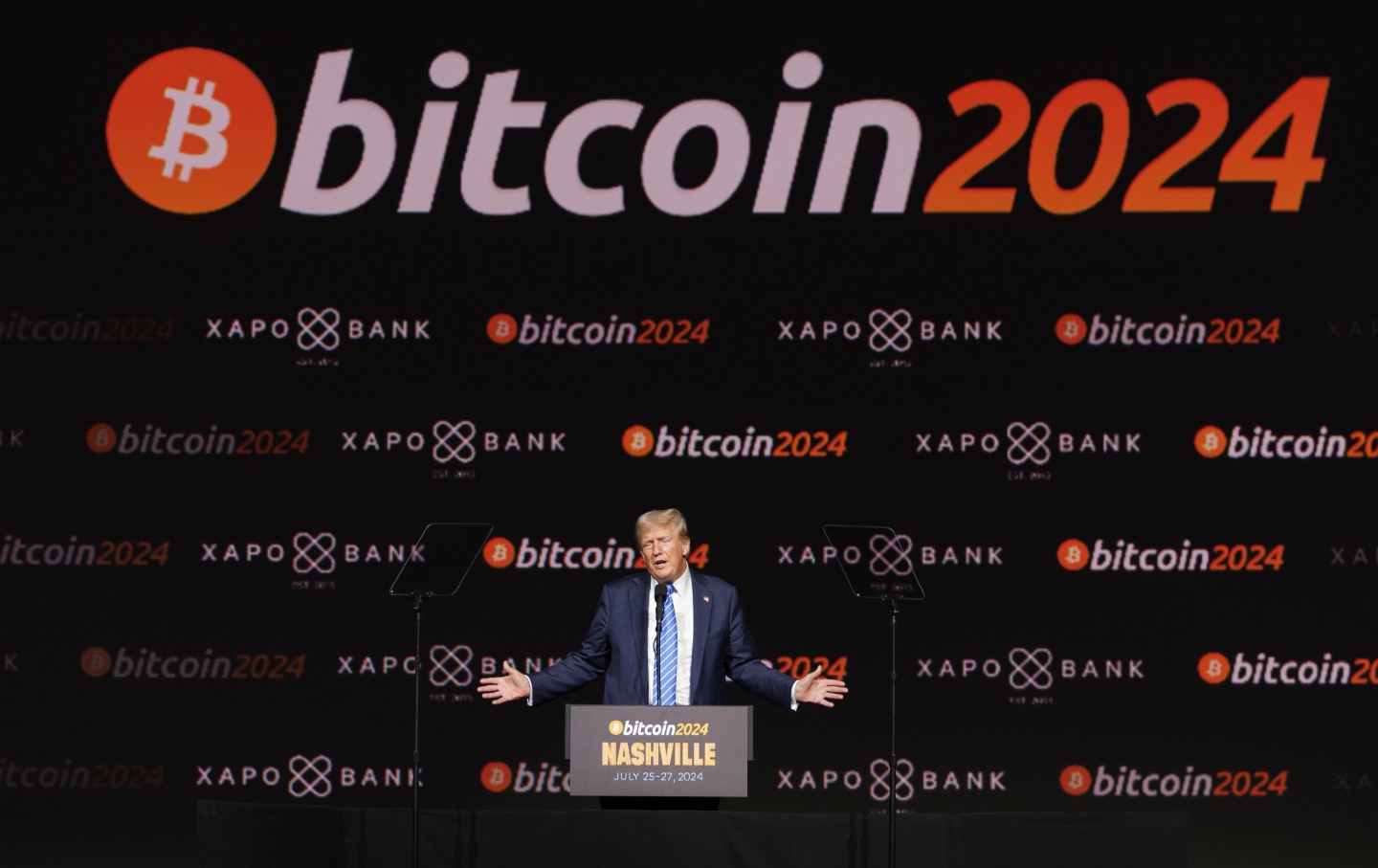
With 10 senators and Trump in attendance at the national Bitcoin conference, the crypto currency moves from the fringes to the center of political life.
Hadas Thier
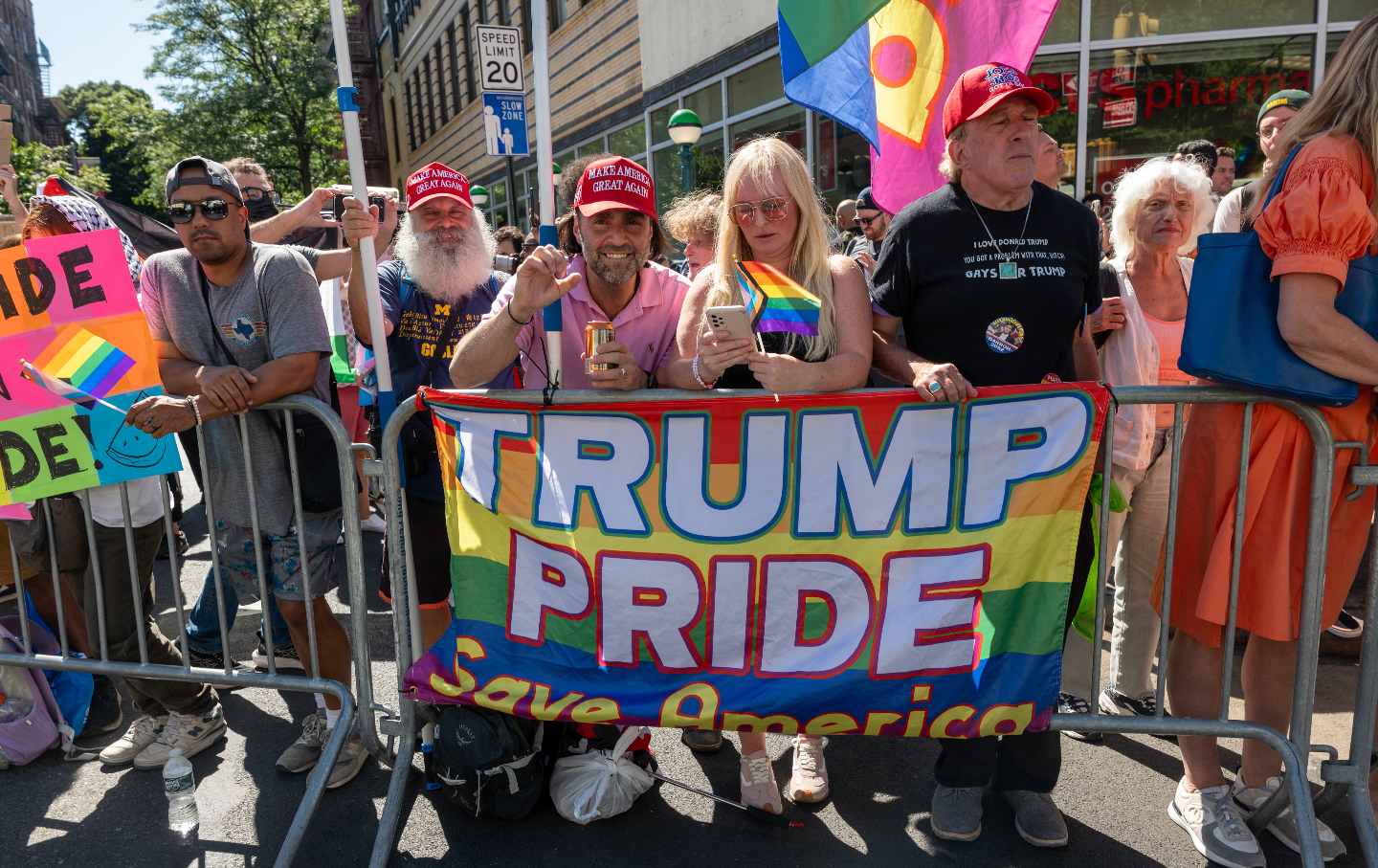
Amid many Republicans’ continued hostility to LGBTQ rights in state legislatures, Democrats call the RNC’s removal of opposition to same-sex marriage “political theater.”
StudentNation
/
Liam Beran
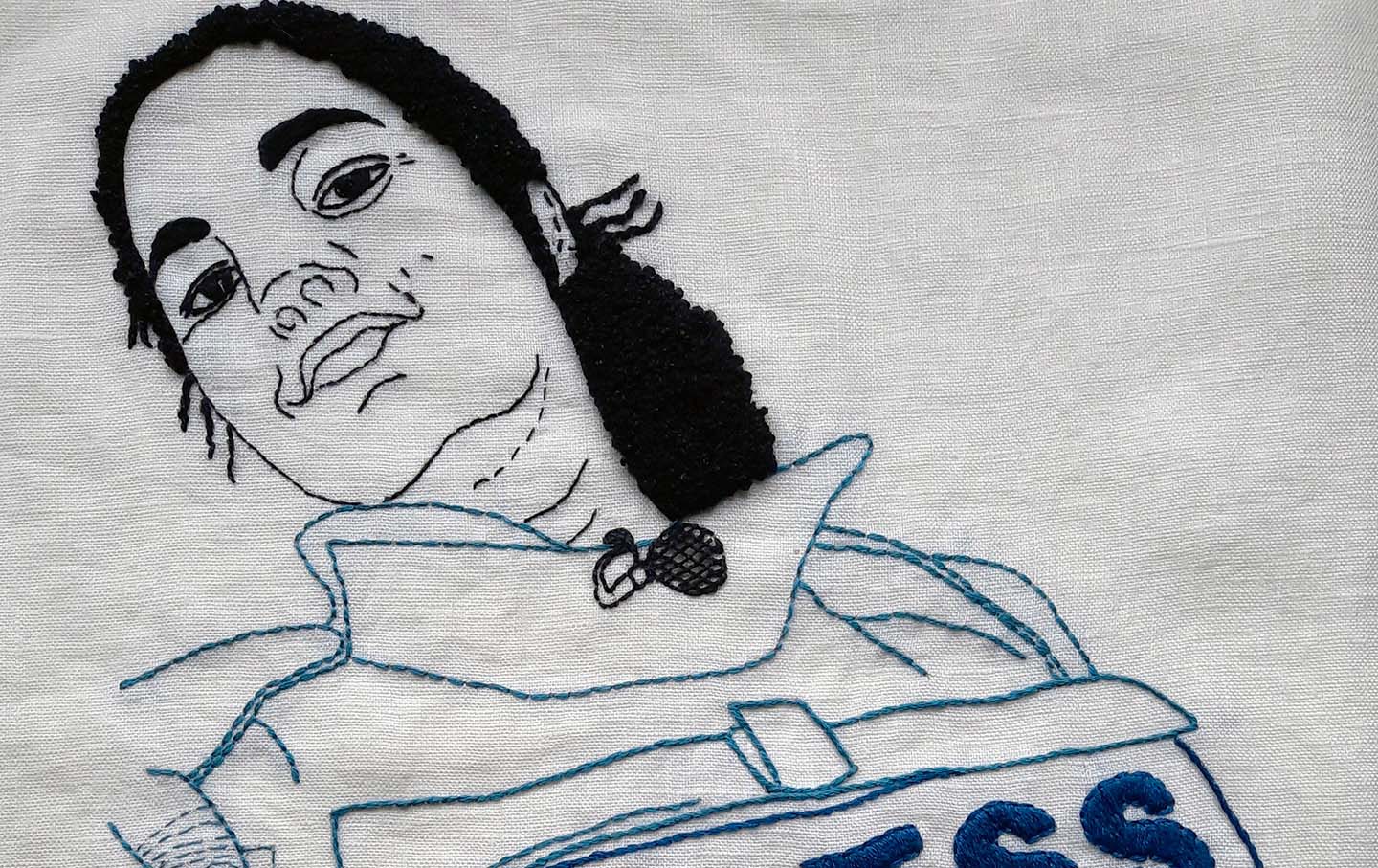
Bisan Owda is a Palestinian journalist, activist, and filmmaker, best known for her social-media videos documenting her experiences in Gaza.
OppArt
/
Rosa Borrás

